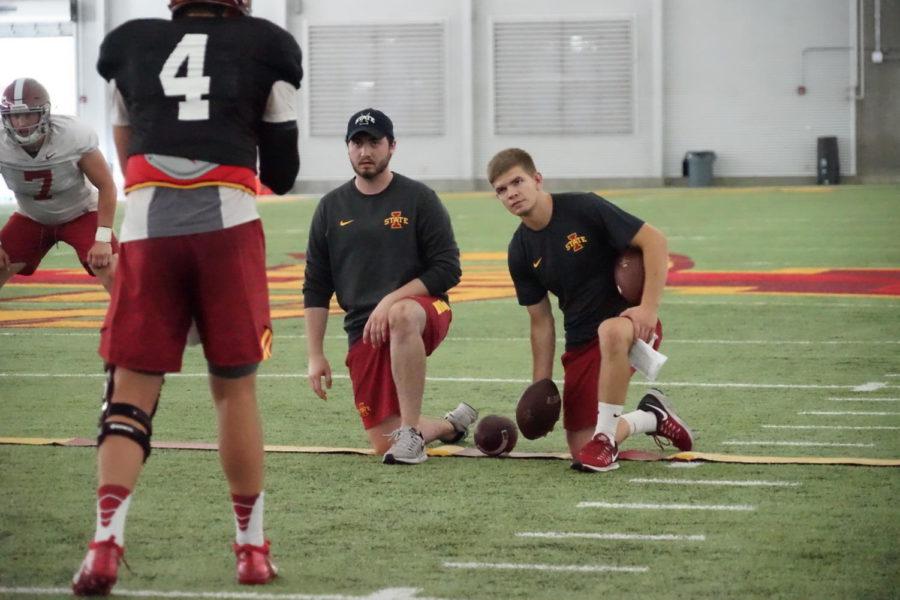Behind the scenes: A look at college football equipment managers
December 10, 2017
The 2017 football season was an impressive one for Matt Campbell’s Iowa State Cyclones, and plenty of national recognition came with it.
Several players were up for national awards, and Campbell received Big 12 and regional coaching awards as well. The team made its first bowl game since 2012, beat two top-five ranked teams in the same month and was a great story for every college football fan in the nation to follow.
But not everyone got to share the spotlight.
Some of the hardest workers on the team aren’t the players, or even the coaches. Iowa State’s equipment managers — there are 10 on staff this season — have been with the team through every up and down, every practice and every game.
“This job, because we work so closely with the coaches, we work so closely with the players, you really do feel like part of the whole group, like we’re all sort of one unit,” said manager and senior Logan Angelo.
It’s also not just an in-season job.
“We don’t do anything in January,” Angelo said. “But as soon as February hits we start doing workouts.”
They help out with winter workouts, spring practices and fall camp — which, despite its name, starts in early August or late July.
The managers do everything behind the scenes to make practices and gamedays go smoothly for the team. They arrive an hour before practice to help set up — or, at least, they try.
“When I work for the defensive line there’s a lot of heavy equipment we’re using,” said manager and senior Ethan Meints. “We’re using chutes and sleds. Coach [Eli] Rasheed, he’s a real strong guy and he moves those sleds a lot faster than I can. He helps out and makes me look kind of silly but it works.”
Sometimes their work involves loading the semi-truck that travels to each away game.
“When you first become a manager the kind of bottom of the totem pole thing is you have to ride with the semi,” Angelo said. “Two managers have to do that every time and so it’s always the new guys. Everyone else flies with the team.”
Other times it means moving sleds around for the defensive line to use in practice. It means setting up the locker room before the game and cleaning up afterwards.
“[We work] approximately 30 to 40 hours a week,” estimated manager and junior Clinton Prier. Angelo jumped in: “If it’s a home game.”
Away games can mean over 40 hours a week for the managers, especially when travel is factored in. This is all on top of being full-time students.
“I’m engaged and I see these guys more than my fiancee,” Meints said with a laugh.
After road games, the managers have to clean up the locker room and get everything ready to head back to Ames. They only get about half as much time to clean up after road games as they spend after games at Jack Trice Stadium. With home games, Angelo estimated it takes about 90 minutes to clean the locker room.
When the team is on the road, that process has to be completed — the locker room has to be cleaned, the semi must be loaded up and the managers need to be in the vans back to the airport — in about 45 minutes.
“It’s just kind of part of the job,” Angelo said. Meints chipped in: “It’s a rush though, too. It’s a lot of work.”
Angelo, Prier and Meints all agreed that it was more fun to clean up after wins.
One of the new challenges this season is the bowl game. Since Iowa State hasn’t been to one in five years, none of the current managers have gone through that extra month of work.
With the upcoming AutoZone Liberty Bowl in Memphis, Tennessee, the coaches and players will leave on Dec. 25 with the game being played on Dec. 30. Several managers will go down to Memphis on Dec. 24 to set up the hotel for the team and get ready for practices.
But that’s all part of the job, and it’s something they all love doing.
One of the favorite memories for all three was the TCU game when the fans rushed the field at Jack Trice Stadium.
Prier, who is in charge of game balls, had the toughest task of anyone.
“As soon as the last ball was snapped, [redshirt senior quarterback] Kyle Kempt took the ball and he threw it a mile in the air,” Prier said, laughing. “I just had to sprint through a crowd of people.”
He wasn’t the only one amazed by the crowd rushing the field.
“I know [senior holder] Kyle Starcevich was laying on the ground, just kind of taking in the moment,” Angelo said. “And some kid just ran by and pulled his towel out of his belt and took off. I was like ‘well, OK, Kyle Starcevich needs a new towel.’”
That kind of sums up the role of equipment managers. Instead of celebrating on the field with the players and fans, the managers were guarding helmets on the sidelines that players had left behind, making notes of what needed to be replaced. They were part of the moment, and their worked had helped the team’s preparation go smoothly, but they still had work to do.
“A really good day for an equipment manager is if nobody notices that you’re even there,” Angelo said. “I think that’s the best day you can have as an equipment manager. If you get noticed, it means that you’re doing something wrong.”
















